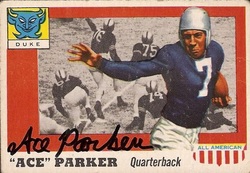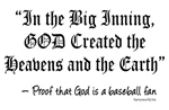
Parker went to Duke University and was a two sport star well before the days of Bo Jackson and Deion Sanders, and even before Jackie Robinson. He graduated in 1936, where he went to pursue careers in both baseball and football. He signed with and debuted for the Athletics in 1937, where he would hit a home run off Wes Ferrell in his first MLB at bat. He did struggle to a .115 average in 94 at bats in his first season, but improved to .230 in 115 at bats in his second year. After the 1938 season, he was traded to Baltimore of the International League, where he would spent the rest of his Professional Baseball career in the minors.
Like most young Americans, he served the United States of America in World War II. This caused a five year gap in playing pro baseball between 1941 and 1946. Playing for Piedmont of the Chicago Cubs system, he had his two best seasons in 1946 (.331) and 1947 (.315) average wise in his career. He stuck around until 1952 when he was age 40.
Clearly Parker's biggest strengths were shown in the NFL, where he was a quarterback, halfback, kicker and punter, who also played defense. When he debuted in 1937 with the Brooklyn Dodgers (NFL), they were a perennial losing team. The NFL was a different game back then, not relying as much on throwing the football. In 1938, he led the NFL in passing yards with 865. His ability to do it all led him to win the NFL Most Valuable Player Award in 1940. In 1940, he threw for 817 yards and threw 10 TDs, ran for 306 yards, caught 3 passes, 2 of them for TDs and led the NFL in PATs. He also played just about every play on offense, defense and special teams. He led the NFL with 6 interceptions and 146 yards and a touchdown. He was just as dominant in 1941, leading the Dodgers to a second straight second place finish. After serving in WWII, he joined the New York Yankees of the All American Football Conference, a new Pro Football League.
He went back to Duke, serving as the Head Baseball Coach from 1953-1966 and an Assistant Football Coach from 1947-1966. He managed in the minor leagues from 1949-1952 for the Durham Bulls. The NFL put him in the Hall of Fame in 1972, where he certainly belongs. His ability to do it all is an example of what young NFL players should look up to. At the time of his passing, he became the oldest living NFL player as well as the oldest Pro Football Hall of Famer ever.
In baseball, he was the last MLB player to be on the field and play with and against Rogers Hornsby. Hornsby was with the AL's St Louis Browns in 1937. It was Parker and Bobby Doerr who were the only ones left to play in a game against the great Lou Gehrig. Now Doerr holds that distinction. It turns out that the struggles he had in his first big league season led him to play football, at the time the least desirable of the two pro sports. You can certainly make a case that Jackson and Sanders had more success, particularly in baseball than Parker had. You can even mention that Sanders, like Parker is a Pro Football Hall of Famer. Sanders did catch a couple of NFL passes, but Parker played just about every down, as a QB, HB, DB, K and P. To me, that is more impressive. And the fact that the competition was much stronger in MLB than it is today, the fact that he toughened it out with all those seasons in the minors after he had already played in the big leagues. Ace Parker was one of the best athletes of his generation, and any generation. Hopefully the youth of today will appreciate what a man like him did as an MLB infielder, a Pro Football Hall of Famer and a defender of his country in World War II. RIP

 RSS Feed
RSS Feed
